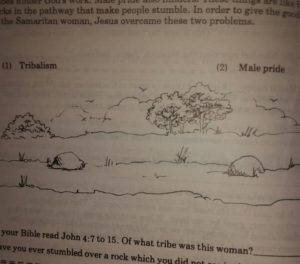
I take in the surroundings of Nashon Gibuke’s home. He is a modest man entrusted with the care of an equally modest gathering of believers, young in the faith.
By the time of this visit he had served as pastor for barely thirty months. Had received the leanest of biblical training. What he might have lacked, however, in polished rhetoric or formalized doctrine, Nashon more than compensated through a faith rooted in personal knowledge of God.
We sipped the chai, exchanging customary amenities in a softer, more subdued manner than usual. Finally I rallied my best voice to offer condolences. This won’t come easily, I guessed.
I watched the pastor. He seemed keenly sympathetic toward me even as he struggled with his own crushing sorrow. He brought a compassionate gaze my way as he leaned forward in his simple, primitive-like chair. “Brother Jerry”, he began “I want to say something”.
It was my turn to lean attentively in his direction. Still, his opening took me back.
“I forgive these men who have done this thing. I forgave them when once I learned of their sad deed”.
Was I hearing correctly? No hint of insincerity belied his low, steady voice. My puzzled expression invited him onward.
“I know that these people do not understand the badness of what they have done. They do not know. They do not understand. They need God and I have begun praying for them that they should know him and gain his peace.”
I sat quiet for a time. I felt an atmosphere change. And was suddenly aware.
Aware of God, his presence here beneath the long grass weavings – the primitive roofing matter of this Kuria hut. I felt transported to a far-away place, a sacred setting. The holy land. I was seated in Solomon’s grand and newly-dedicated temple of the Living God. I stood alongside Isaiah, trembling at booming angel voices crying Holy, Holy in the hallowed sanctuary. And considered the earthen floor here under my feet. It might easily have dictated with hushed voice that I remove my shoes.
I knew a reversal of roles had taken place here in Kuria country. I, the missionary-teacher had come to extend comfort, but rather sat quietly, while a young, sparsely-educated, under-compensated pastor stepped, so to speak, to his lectern. His non-sermon to me – his audience of one – conveyed with astonishing eloquence the message of an ancient grace. Of mercy, traceable only to one place. Heaven.
Bwana Asifiwe – the Lord be praised. Indeed.
©2017 Jerry Lout


